- Home
- Todd Strasser
Can't Get There from Here Page 9
Can't Get There from Here Read online
Page 9
Later, Maggot asked, “Anybody hungry?”
“Yeah.” Rainbow started to get up, so I did too. OG didn’t move. Maggot and Rainbow and me went across the street to the sidewalk.
“Spare a quarter? Some kind of change?” Maggot said to a man wearing a long gray coat. The man ignored him.
“Spare change?” Maggot asked a man with a beard wearing a puffy light blue down jacket. “We’re hungry and cold.” Ignored again.
“Spare change?” Maggot asked a woman wearing a long red coat. She hurried past.
“Forget this,” Maggot said. “Let’s look for the Hari Krishnas.”
The Hari Krishnas sometimes came around handing out plastic bowls of bean soup, but it must have been too cold for them. The church van that gave out hot dogs wasn’t around either.
“Guess it’s time to Dumpster dive,” Maggot said.
In an alley behind a pizza place, Maggot climbed into a dark green Dumpster. I heard a loud meow, and two scrawny cats shot out of the Dumpster and scampered away down the alley. Maggot climbed back out. In his hands were a bunch of pizza slices.
“Check it out,” he said. “Frozen pizza.”
The slices were hard as rock, but we broke off pieces and put them in our mouths and waited for them to soften. Eating pizza that way just made me feel colder, and before long I felt as chilled inside as I was outside.
“What a feast!” Maggot raved when we were done. “Who wants to go to the deli for coffee and dessert?”
I’d go anyplace that might be warm. On the way we met the boy named Lost, the one with the orange-tipped Mohawk. He was wearing a thick gray blanket around his shoulders like a shawl. He said something to Rainbow that I couldn’t hear.
“See you guys later,” Rainbow said and went off with him. I felt my heart ache.
“She’s all you’ve got, huh?” Maggot’s voice caught me by surprise. He was looking at me with a soft, sad expression on his face. He didn’t say it in a mean way. Just pitying, which might have even been worse. I started to walk, staring down at the sidewalk.
Maggot caught up to me. “Hey, Maybe, I’m sorry.”
“Don’t be.”
“It’s just—” he started, then stopped, then started again. “It’s just hard for me to believe that this is your whole life.”
“It’s your life, too,” I reminded him.
“Yeah … I guess.”
We begged outside the Good Life until someone bought us coffee.
Later on Rainbow came along dragging her feet, her eyes as blank as a zombie’s. She backed against the wall and dropped down hard to the sidewalk, where she sat with her head nodding, blond hair hanging down between her knees.
SIXTEEN
It was dark when the police van came around the corner. I was sitting against the wall next to Rainbow. The cops only used the van when they did a sweep. Most of the time we ran away. But Rainbow wasn’t running tonight.
The van stopped at the curb, and that policewoman with the streaked blond hair, Officer Ryan, got out. She was wearing white surgical gloves. I stood up on the sidewalk, not sure whether to run. Officer Ryan walked over to Rainbow. “Hey,” she said.
Rainbow sat with her head bowed and her blond hair falling into her lap.
“Can you get up?” Officer Ryan asked. Rainbow didn’t answer.
Officer Ryan stepped closer and pulled the long black baton from her belt.
“Don’t hurt her,” I said.
“I’m not going to,” Officer Ryan answered. With the tip of the baton she touched the side of Rainbow’s leg. Rainbow jerked her head up, but her hair remained covering her face like a sheepdog.
“Can you get up?” Officer Ryan asked again.
Rainbow shook her head. You didn’t see her face, just a mop of blond hair swaying back and forth.
“You’re going in,” Officer Ryan said. “Either get up by yourself or I’ll have to get you up.”
“I’ll help her,” I said. I didn’t want Officer Ryan to touch Rainbow.
“I’ll have to take you in, too,” said Officer Ryan.
“I don’t care.”
Officer Ryan stepped back. “Be my guest.”
I kneeled close enough to Rainbow to catch a strong whiff of her smell. It was sharp and bitter. “I’ll go with you and make sure you’re okay.”
Rainbow raised her head. “My hero.”
I slipped my hands under her arms and had to use all my strength to help her up. Shaking and unsteady, she got to her feet. I didn’t let go because I was afraid she might fall. Her hair clung to her face like a mop, and her smell was like acid burning in my nose. Under her clothes her arms felt thin and bony, the flesh loose.
I steered her toward the van. The rear windows had wire grating over them. Officer Ryan pulled open the doors. Under a plastic light in the ceiling I saw five others already inside sitting on two benches. They were all older. Some wore blond or red wigs and had faces painted like totem poles.
“You have to step up,” I told Rainbow.
She didn’t move.
“Come on,” I said. “Pick up your foot.”
She started to lift her foot, then lost her balance and began to fall. I tried to stop her, but then I started to fall, too. A pair of stronger hands caught my shoulders. It was Officer Ryan.
“I’ll hold her,” she said. “You get her in.”
I climbed into the van and Officer Ryan guided Rainbow in. Me and Rainbow sat on the bench and Rainbow’s head fell back and thumped against the wall. Her eyes never opened. Officer Ryan slammed the doors shut.
The van lurched. The back where we sat smelled sweet and sour. Perfume and urine. The others stared at Rainbow and me.
“Oh, look, it’s kindergarten,” sniggered a woman with a big, fluffy blond wig.
“Shut up,” another muttered. “Bet you was probably that young when you started.”
“Not that young,” huffed the fluffy blond. “And I never looked that fine.”
“That’s for damned sure,” agreed a long-legged woman wearing a straight red wig. The others laughed.
The fluffy blond leaned toward Rainbow. “Let me see something.”
I slid over, placing myself between her and Rainbow.
“Ooh, look, she got a protector,” the fluffy blond said. “Whatsa matter, honey? You afraid I might do something to your friend?”
“Maybe.”
“I ain’t gonna hurt her.” The blond extended a long, curved, fake red fingernail. It was shaped like a claw. “I just want to touch her. See if she’s real.”
I didn’t budge. She wasn’t going to touch Rainbow if I could stop her.
“Leave ’em alone,” said the one with the long red wig.
The van stopped again. The doors opened and a woman with short, straight black hair climbed on. She looked at Rainbow and me and sneered, “What’s this, the school bus?”
At the police station Officer Ryan and a male police officer with a red mustache stood by the back door of the van and looked at each of us as we got out. “You come with me.” The male police officer pointed a finger at the long-legged woman with the long red wig.
“We going somewhere?” the woman asked with a suggestive wink.
“Yeah, over to the men’s division.”
Officer Ryan led the rest of us inside to a big cell. Rainbow was walking a little better by then. She pushed the hair out of her face. Her forehead was streaked with dirt and her sunken eyes had dark rings under them. The cell had a toilet sticking out of the wall in the corner. The toilet had no seat, but every time I looked someone was sitting on it. Rainbow slumped down in the corner and let her head dip. I sat next to her with my back against the cold concrete wall.
Officer Ryan and another policewoman with black hair took people out of the cell one by one. When it was my turn Officer Ryan said, “Come on, there’s someone I want you to talk to.”
She took me down a narrow yellow hall and into a large room with lots of desks. Mo
st of them were empty, but I was led to one where a heavy man with gray hair sat at a computer. He wore a white shirt with thin blue stripes.
“This is Detective Charles,” Officer Ryan said. “He’s in charge of our youth program. I have to go back and process the others, but he’d like to talk to you.”
Officer Ryan left. Detective Charles pointed to a scarred wooden chair beside his desk. “Have a seat.”
I sat down.
“How old are you?” he asked.
“I forget.”
He smirked. “What’s your name?”
“I forget.”
“How about your street name?”
“I forget.”
“Bet you don’t have any ID on you either.”
Since it wasn’t a question, I didn’t have to answer. Detective Charles leaned forward and started to type on the computer. I looked at the framed pictures on his desk. Photos of him with a woman with frosted hair who was probably his wife. Him with his arms around two tall thin boys with dark hair and his eyes. His sons.
Detective Charles stopped typing on the computer and leaned back in his chair. He put his hands behind his head.
“So what are you? Fourteen? Fifteen?”
“I forget.”
“You know, I. Forget, right now you may still be young enough to get off the street. But you’re running out of time. Pretty soon there’ll be no going back.” He paused and waited to see if I’d answer. I didn’t.
“I ain’t talking about going back home,” he went on. “I’m talking about going back to society. Back to sleeping in a real bed instead of the sidewalk, and eating off a plate with a knife and fork instead of out of a Dumpster with your fingers. Back to getting new clothes in a store instead of the used rags they leave for you on the fence in front of the church. If I were you, I’d think about that, I. Forget. Because you’re getting pretty close to the point where you’re gonna forget a lot more than your name. You’re gonna forget how to be a human being. Then there’ll only be three places for you. Jail. The street. And in the ground.”
He paused again. When I didn’t say anything, he said, “Or maybe it’s already too late. Maybe you already know all this, and I’m just an old boring fart wasting both our time.”
I wasn’t even listening. I was thinking about Rainbow, all alone in that cell full of strangers.
“Hey, I. Forget,” Detective Charles said. “Stay with me for one more second, okay?”
I looked at him. His face was shiny, almost like it was covered by a thin coat of oil. His nose was big and red and pitted, like a strawberry.
“You could have a life, understand?” he said. “You’re still young enough to go back to school, learn a trade, whatever. You could have a place to live. A bed. A TV set. A refrigerator to put food in. Someday you could have a car. You could get off the street and go places. Let me ask you something, I. Forget. You ever seen the ocean?”
I nodded.
He scowled a little. “Where?”
“TV.”
“Yeah, right. Only that’s not the ocean, okay? That’s just a picture. It ain’t real. Like a picture of fire don’t feel hot. You gotta see it in person. You gotta feel it and smell it. I don’t care what you’ve seen on TV or in the movies. You ain’t seen the ocean unless you’ve stood with your feet in the sand and the waves washing up to your knees. You know, they say life came from the ocean, and I believe it. You get out there and you feel that water run over you and you smell that salt spray in the air, and it’s like you’re right back at the beginning of time. You look at those waves and the sky and the clouds and sun and all that water. Endless amounts of water. And you feel like you could wash in it. Wash away everything bad. Every crappy unfair thing that ever happened to you, gone. Then you could start all over again. A whole new beginning just like the day you were born. You could do it, I. Forget. Start over. You think that miserable, dirty, hungry street world out there is the only life there is for you, but it ain’t. There’s other lives. Plenty of ’em. You can get out of here and go someplace else. Anywhere you want, I. Forget.”
I was listening. I was there, at the edge of that ocean I’d never been to. My bare feet sinking in sand they’d never stood in, feeling the ocean water I’d never felt.
“I want you to do me a favor, okay, I. Forget?” Detective Charles said. “I want you to think about it, and if you decide you want to go see the ocean, you come back here and tell me, okay?”
He leaned forward in his chair and reached into his jacket pocket, pulled out an old, brown leather wallet and took out a white business card. He handed it to me.
“Don’t forget, I. Forget,” he said. “This ain’t the only life. There’s plenty others. And all of them are a damn lot better.”
He took me back to the cell. The others weren’t happy to see me.
“Look what your friend did,” the fluffy blond said.
Rainbow was lying on the floor, her face at the edge of a small pool of yellowish, smelly puke. I went over and helped her sit up. She opened her eyes for a moment, then closed them again. I used the sleeve of my sweatshirt to wipe the mess off Rainbow’s face and off the collar of her leather jacket. The smell was harsh and strong and made me feel like barfing, too.
The woman with the short black hair came over. “It’s a good thing she was lying on her side. That happens when she’s on her back and she’ll breathe it into her lungs and choke to death.”
“What you gonna do about that?” The fluffy blond pointed at the yellow puddle on the floor.
I pulled off my sweatshirt and laid it over the puddle. Then I sat with my back against the wall and Rainbow’s head in my lap, waiting for whatever happened next.
SEVENTEEN
I stroked Rainbow’s yellow hair. It was knotted and filthy. I picked out some of the bigger pieces of dirt and tried to undo some of the smaller tangles without pulling on her hair hard enough to hurt her. Rainbow’s lips were cracked and scabbed. Drool dripped out of the corner of her mouth, and I wiped it away with the bottom of the T-shirt Anthony, the library man, gave me. I wondered where I left that brown sweater with the buttons. I could have used it now.
Around the cell the women talked about what they did and how they were treated.
“When I get out of here I’m leaving town. This is the last night I’m spending in jail.”
“That man takes every penny I make.”
“All I gotta do is kick the junk and I’m outta this life.”
“Anyone know what time it is?” the small woman with the short black hair asked.
“Why, you got a date?” asked the fluffy blond. A couple of women laughed. No one knew the time. I didn’t even think about it anymore. Not in hours or minutes or seconds, at least. Instead there was sleeping time and waking time. There was begging for money time and the time when you ate or scored drugs or drank. There was day time and night time. Time when you were scared and time when your stomach hurt. There was feeling cold or sick time and time when you felt okay.
Sometimes when Maggot talked about all the poor people and the revolution I would wonder about the rest of the world. The world away from the street. What happened yesterday? Was there a war somewhere? Did terrorists blow up another building? Did they discover life on another planet? I never wondered for long because then I’d get hungry and have to look for something to eat. Or I got cold or I needed money. I guess that’s why homeless kids don’t go to school. They’re too busy just trying to stay alive.
The cell door opened and Officer Ryan and the lady cop with the black hair came in, their black flashlights and nightsticks thumping against their thighs. They started toward us. I stopped breathing. They were coming for Rainbow.
I slid my arms around Rainbow’s body. The policewomen stood over us with their hands on their hips.
“Can she get up?” Officer Ryan asked.
“I don’t think so.”
“Tell her you got some rock,” said the fluffy blond. “She get right up f
ast.”
“Back off,” Officer Ryan warned. She kneeled closer and reached toward Rainbow’s face. “Let’s see if we can wake her.”
“Don’t touch her,” I said.
“We have to see if she’s okay.”
“She’s okay,” I said.
“She could be OD’ing right now.”
I shook my head. “She was okay before.”
“You have to let us take her,” Officer Ryan said. “See those plastic bands on her wrists? That means she left a hospital without permission. We have to follow up on that.”
I tightened my arms around her. Rainbow was all I had in the world. If they took her away I might never see her again.
The policewoman with the black hair glared down at me impatiently. “I’m only gonna tell you this once. Let her go … now.”
I held on, feeling Rainbow’s chest expand and contract as she breathed. I knew she wasn’t OD’ing.
“If that’s the way you want it.” The black-haired policewoman started to reach down, as if she was going to tear Rainbow out of my arms.
Officer Ryan said, “Don’t.”
“For God’s sake, Jane,” the black-haired policewoman sputtered.
Still kneeling in front of us, Officer Ryan spoke softly. “We have to take your friend. She could be sick. She may need medical attention. You have to let her go. Trust me. She’ll be okay.”
She sounded like she meant it. Only, that’s what grown-ups did so well. They knew how to sound like they meant everything they said. But then they changed their minds. Or, more likely, they never really meant it in the first place. They were just lying to get you to do what they wanted. So you learned not to believe them. You learned to take what they gave when they were nice. But to always be ready for them to turn on you. Because ninety-nine percent of the time that’s exactly what they did.
The black-haired policewoman muscled in. “Look,” she growled at me, “either you let go of her or I get rough. Either way she’s going with us. Just depends on how bad you want to get hurt in the process.”
I hardly cared about being hurt. Been hurt plenty. But letting go of Rainbow would really hurt. Every time she went away I never knew if I would see her again. “She’s okay.”

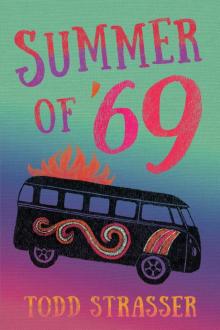 Summer of '69
Summer of '69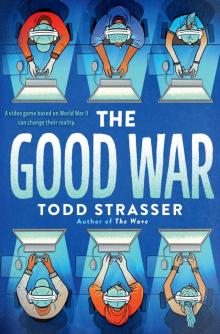 The Good War
The Good War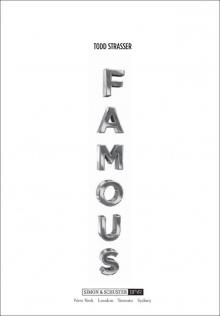 Famous
Famous If I Grow Up
If I Grow Up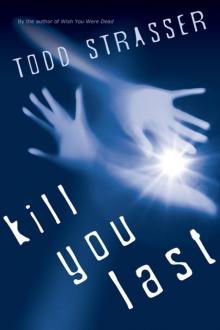 Kill You Last
Kill You Last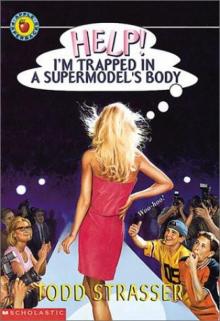 Help! I'm Trapped in a Supermodel's Body
Help! I'm Trapped in a Supermodel's Body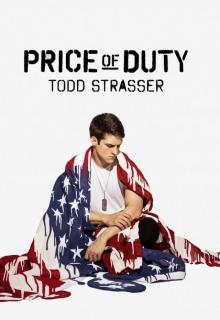 Price of Duty
Price of Duty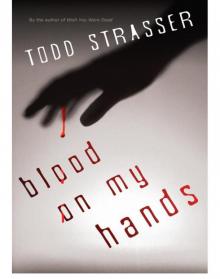 Blood on My Hands
Blood on My Hands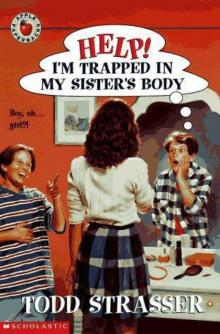 Help! I'm Trapped in My Sister's Body
Help! I'm Trapped in My Sister's Body sidewayz glory
sidewayz glory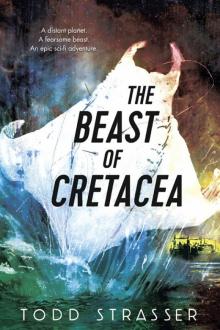 The Beast of Cretacea
The Beast of Cretacea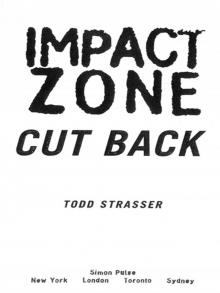 Cut Back
Cut Back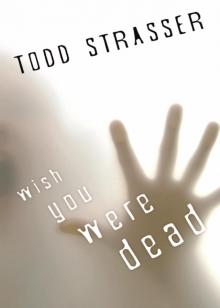 Wish You Were Dead
Wish You Were Dead The Wave
The Wave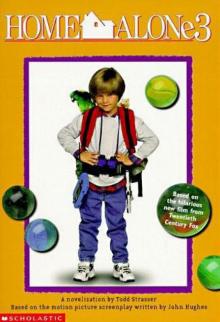 Home Alone 3
Home Alone 3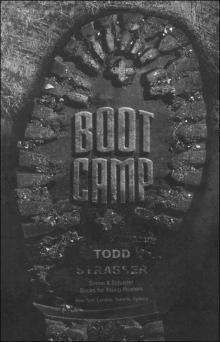 Boot Camp
Boot Camp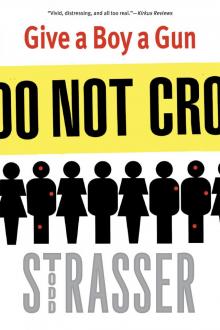 Give a Boy a Gun
Give a Boy a Gun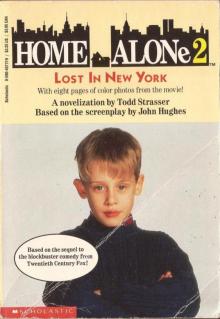 Home Alone 2
Home Alone 2 The Shore
The Shore Can't Get There from Here
Can't Get There from Here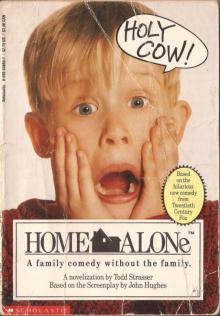 Home Alone
Home Alone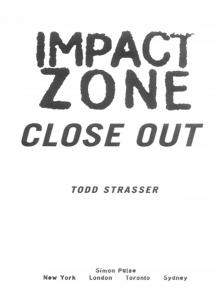 Close Out
Close Out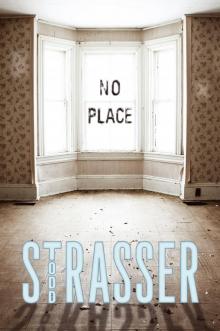 No Place
No Place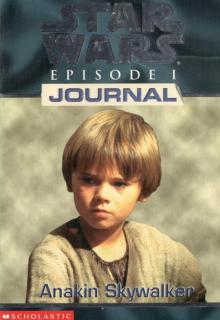 Star Wars - Episode I Journal - Anakin Skywalker
Star Wars - Episode I Journal - Anakin Skywalker